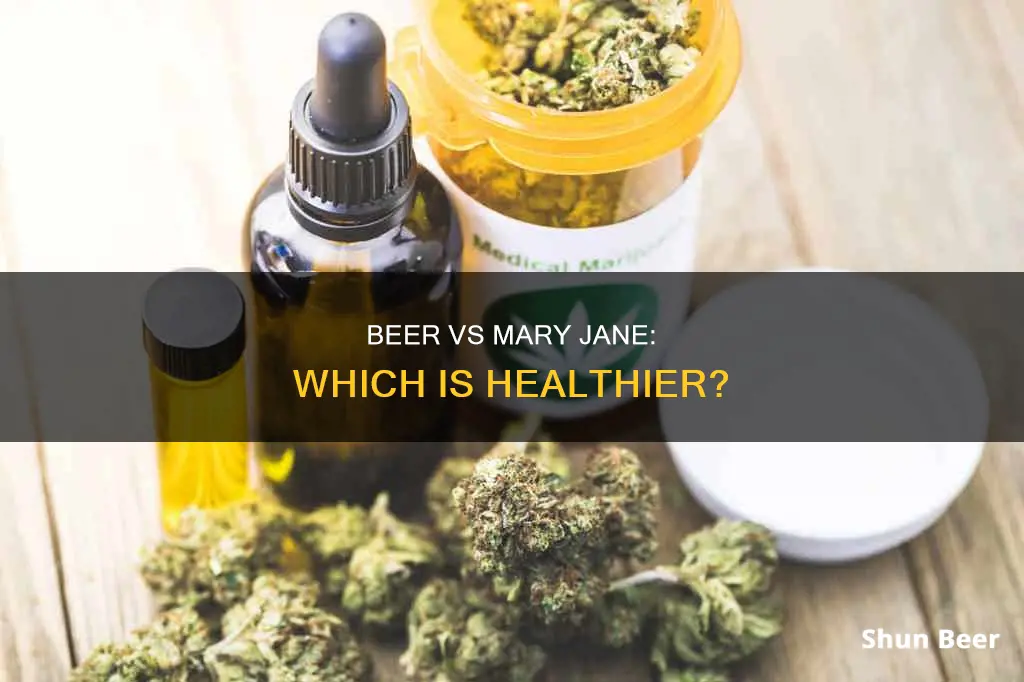
Alcohol and marijuana are both intoxicants, but they have different effects on the body and the risks associated with their use are not the same. While both substances can be addictive, alcohol dependence is more common and more dangerous. Alcohol is linked to liver disease, pancreatitis, heart damage, stomach and digestive issues, and central nervous system damage, among other issues. It is also a known carcinogen, contributing to cancers and cancer deaths. Marijuana, on the other hand, may have some health benefits, including relief for chronic pain and nausea and vomiting from chemotherapy. However, it can also increase heart rate and blood pressure and impair coordination and balance. The long-term effects of marijuana are less clear, but there are concerns about its impact on brain development and mental health.
What You'll Learn

Beer has more calories and can lead to weight gain
The calorie content of beer depends on its strength, with higher alcohol content leading to more calories. A typical pint of lager contains 180 calories, which is the same as a slice of pizza. Stouts and ales can be even more calorific, containing around 250 calories, which is similar to a whole bagel. A pint of cider has about 216 calories, roughly the same as a sugared doughnut.
When compared to other alcoholic drinks, beer tends to have a higher calorie count. For example, a 1.5-ounce serving of spirits has around 97 calories, while a 5-ounce glass of red wine contains approximately 125 calories. In contrast, a standard 12-ounce serving of beer has 153 calories.
The high-calorie content of beer can contribute to weight gain, particularly around the belly, often referred to as a "beer belly." The risk of developing a beer belly increases with the amount of beer consumed. Research suggests that drinking more than one beer per day or engaging in regular binge drinking raises the likelihood of gaining belly fat and experiencing other health issues.
In addition to the calories from alcohol, beer also contains sugar, which further contributes to the total calorie intake. The breakdown of alcohol by the body takes precedence over other sources of fuel, including stored fat. As a result, regular beer consumption can hinder fat burning and promote weight gain.
While the link between beer and weight gain is well-established, it is important to note that individual factors, such as metabolism, lifestyle choices, and overall diet, also play a role in determining the impact on an individual's weight.
Lambic Beer: Healthy Choice or Just a Fad?
You may want to see also

Alcohol is linked to several types of cancer; marijuana is not
Alcohol is linked to several types of cancer, while there is insufficient evidence to conclude that marijuana has the same effect. Alcohol is a well-known contributor to cancer, with around 6% of all cancers and 4% of cancer-related deaths in the United States being attributed to alcohol consumption. It is linked to cancers of the mouth, throat, voice box, esophagus, liver, colon, rectum, and breast. The risk of developing these cancers increases with the amount of alcohol consumed. Even small amounts of alcohol can increase the risk of certain cancers, such as breast cancer.
On the other hand, marijuana smoke does contain carcinogens, and there is a possibility that long-term marijuana smoking may increase the risk of certain cancers, particularly lung, head, and neck cancers. However, the evidence for this is not as strong as the evidence linking tobacco smoking to cancer. Some studies suggest that marijuana use may be associated with a higher risk of certain cancers, but other studies contradict these findings. The quality of the research on the link between marijuana and cancer is generally not as high as that for alcohol and cancer.
While it is clear that alcohol contributes to cancer risk, the link between marijuana and cancer is less certain. More research is needed to definitively conclude whether or not marijuana use increases the risk of cancer.
It is worth noting that both alcohol and marijuana have health risks beyond their potential links to cancer. Alcohol, for example, can cause liver disease, pancreatitis, heart damage, digestive issues, and central nervous system damage. Marijuana, on the other hand, may be linked to brain development issues and schizophrenia, although more research is needed to fully understand these potential risks.
Beer Dilution: Healthier Option or Just Weakened Taste?
You may want to see also

Marijuana may be harder on your heart
People with a history of heart disease should be cautious about using marijuana, as studies suggest that the risk of a heart attack is several times higher in the hour after smoking marijuana than it would normally be. Research also suggests that marijuana smoking may increase the long-term death rate among heart attack survivors.
However, it is important to note that most of the evidence linking marijuana to heart problems is based on reports from people who smoke it. The impact of marijuana edibles on the heart is not yet well understood.
While marijuana may have a more immediate impact on heart rate, alcohol is linked to a higher risk of long-term heart damage. Heavy drinking can take a toll on the cardiovascular system, and is a leading cause of heart disease.
In summary, while marijuana may pose a more immediate risk to heart health by increasing heart rate, alcohol is associated with a higher risk of long-term heart damage. More research is needed to fully understand the cardiovascular effects of marijuana, particularly in edible form.
Two Beers a Night: Healthy Habit or Slow Poison?
You may want to see also

Alcohol is more strongly linked to violence
Alcohol is strongly linked to violent behaviour, particularly in the home. Research has shown that alcohol is a factor in 40% of violent crimes. In the US, 40% of reported domestic violence cases involve alcohol. In the UK, two-thirds of domestic incidents reported to the police involve alcohol.
Alcohol impairs judgement and increases the risk of aggressive behaviour. It is a factor in a range of violent crimes, including property crime, public-order offences, driving while intoxicated, assault and homicide. On average, roughly 40% of inmates incarcerated for violent offences were under the influence of alcohol at the time of their crime.
Alcohol's effects on the brain are linked to violent behaviour. Alcohol consumption has been found to cause morphological changes in brain regions involved in self-control, decision-making and emotional processing. These changes can increase the risk of violent behaviour.
Alcohol is also associated with intimate partner violence, with two-thirds of victims reporting that the perpetrator had been drinking. Alcohol can lead to aggression, intimidation, forced sexual activity and other forms of controlling behaviour.
The link between alcohol and violence is particularly strong in men. However, women who are heavy drinkers also tend to suffer from higher levels of aggression from their partners.
Unclarified Beer: Healthier Choice or Marketing Ploy?
You may want to see also

Alcohol is more addictive
While marijuana and alcohol are both addictive substances, alcohol appears to be more addictive.
According to a 1994 survey, of those who had tried marijuana, roughly 9% eventually fit a diagnosis of addiction. For alcohol, the figure was about 15%. A 1998 report by the National Institute on Drug Abuse and the University of California, San Francisco, concluded that alcohol's addiction potential is significantly greater than that of marijuana. This is supported by a federal study by the National Academy of Sciences Institute of Medicine, which found that "few marijuana users become dependent on it" and that "marijuana dependence appears to be less severe than dependence on other drugs (including alcohol and nicotine)".
Research shows that the lifetime risk of dependence is lower for marijuana than for most other drugs, including alcohol. Of all the people who smoke marijuana, about 9% will become dependent. In comparison, about 16% of all the people who drink alcohol will become alcoholics.
However, it is important to note that the legal status of marijuana may be a confounding factor in addiction statistics. As marijuana has been illegal for decades, people have not been able to buy it as easily as alcohol. This limited availability may have skewed the addiction statistics, and the addiction rate may increase with greater availability.
Beer Fasting: Healthy Choice or Harmful Habit?
You may want to see also
Frequently asked questions
Beer affects your brain's communication system, altering your judgment, mood, and coordination. Marijuana can also impair your coordination and balance, and lower your inhibitions.
Long-term alcohol use can lead to liver disease, pancreatitis, heart damage, stomach and digestive issues, central nervous system damage, erectile dysfunction, and infertility. Marijuana use has been linked to brain development issues and schizophrenia, and may worsen psychiatric issues.
Beer is a rich source of vitamins and minerals, and some beers contain antioxidants. Research suggests that drinking one to two beers a day may lower your risk of heart disease and improve blood sugar levels. Marijuana has been found to help with nausea and vomiting from chemotherapy, improve sleep in people with chronic pain, and enhance quality of life in people with health conditions.







